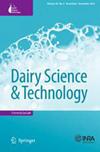Effect of Parmigiano Reggiano Consumption on Blood Pressure of Spontaneous Hypertensive Rats
Q2 Agricultural and Biological Sciences
引用次数: 0
Abstract
In recent years, due to the significant increase in hypertension, peptides which are able to reduce blood pressure have gained special interest by scientific research and food industry. Several bioactive peptides with ascertained ACE-inhibitory activity have been found in Parmigiano Reggiano (PR) cheese and/or mixtures deriving from its digestion in vitro, and this may be predictive of its potential antihypertensive effect in vivo. This study investigated the long-term effect of feeding (PR) cheese on blood pressure (BP) of spontaneously hypertensive rats (SHRs). A total of 30 male SHRs, 13 weeks old, were subdivided into 6 groups balanced for body weight and BP, to receive daily dietary supplementation with: 0.1–0.2–0.4–0.6 g PR/rat, captopril, and water. Systolic and diastolic BP were recorded every two weeks, for 10 weeks. Blood samples were collected at the end of the trial. Dietary integration with PR led to a transitory reduction in rats’ pressure in the first 35 days of treatment and pressure decreased in a dose-dependent manner. In the second part of the study, the beneficial effect of PR antihypertensive peptides may have been masked and reduced by the increase in BP of rats linked to the rise in age of animals. No PR derived peptides were detected in rats’ serum. Highlights: Parmigiano Reggiano (PR) cheese led to a transitory reduction in rats’ pressure in the first 35 days of treatment. This effect was PR dose dependent. The highest amounts of PR tested did not increase both systolic and diastolic blood pressures of hypertensive rats.帕尔马干酪对自发性高血压大鼠血压的影响
近年来,由于高血压的显著增加,具有降血压功能的多肽受到了科学研究和食品工业的特别关注。在Parmigiano Reggiano (PR)奶酪和/或其混合物中发现了几种具有确定的ace抑制活性的生物活性肽,这可能预示着其在体内的潜在降压作用。本研究探讨了饲喂奶酪对自发性高血压大鼠(SHRs)血压的长期影响。将30只13周龄雄性SHRs按体重和血压再分为6组,每日添加0.1-0.2-0.4-0.6 g PR/大鼠、卡托普利和水。每两周记录一次收缩压和舒张压,持续10周。在试验结束时采集血样。在治疗的前35天,膳食中整合PR可导致大鼠血压短暂降低,且血压降低呈剂量依赖性。在研究的第二部分,PR降压肽的有益作用可能被与动物年龄增加有关的大鼠血压升高所掩盖和降低。大鼠血清中未检测到PR衍生肽。亮点:Parmigiano Reggiano (PR)奶酪在治疗的前35天导致大鼠的血压短暂降低。这种效应与PR剂量有关。最高量的PR测试不会增加高血压大鼠的收缩压和舒张压。
本文章由计算机程序翻译,如有差异,请以英文原文为准。
求助全文
约1分钟内获得全文
求助全文
来源期刊

Dairy Science & Technology
农林科学-食品科技
CiteScore
2.30
自引率
0.00%
发文量
0
审稿时长
2 months
期刊介绍:
Information not localized
 求助内容:
求助内容: 应助结果提醒方式:
应助结果提醒方式:


